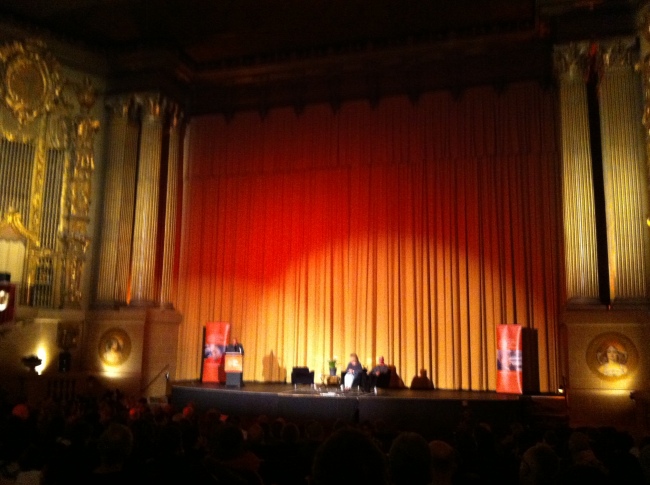Divisiveness of SF Pride's Manning Decision is Nothing New for the LGBT Community
The LGBT rights movement is by no means a monolithic group, and the
range of opinions was contextualized Wednesday night when famous
activists Dan Nicoletta and Anne Kronenberg took the stage for an event discussing the impact of Harvey Milk at the Castro Theater hosted by Facing History and Ourselves.
During the Q&A the recent SF Pride controversy around Bradley Manning's nomination and subsequent removal from the grand marshal list was brought up, where Dan Nicoletta diplomatically supported SF Pride, the representation of Manning in the movement, as well as the process of debating and disagreeing with each other.
Replying to the question about what he thought about the controversy Nicoletta answered, "And you know I love Pride... and I've worked intimately with Pride... So the discourse is heartbreaking but I think Stuart Milk so eloquently always says that our differences are our strengths and we are going to have fights and we should fight... we'll figure it out, it's a complex issue and I think by giving that spokesperson for Bradley Manning a place to talk about those issues we're doing the right thing...
"Just like in Harvey Milk's Day... under the pressures from the rest of the world when Anita Bryant challenged us at the ballot box and John Briggs challenged us at the ballot box... there was a lot of scrambling to be something other than what we are. To have our arguments in public, I think that's a healthy thing and we will figure it out."
Dan Nicoletta's photography has done much to document Harvey Milk's life as a politician in San Francisco and both he and Anne Kronenberg, who got her start in politics working with Milk, spoke at length about how they think Milk would have lead today had it not been for his assassination.
Meanwhile in current San Francisco LGBT politics, Supervisor David Campus wrote a strong letter to SF Pride in which he said, "The decision to rescind this honor is unprecedented and the community has every right to be concerned about the consequences of this abrupt, top-down directive. Most importantly, however, is the obligation Pride has to be accountable, transparent and representative to the diverse LGBT community it serves. As an organization which receives City funding, Pride has a responsibility to operate with transparency and accountability, and to allow for timely appropriate discussions with the community as needed. The failure of Pride leadership to do so in this circumstance is contrary to this responsibility."
"Controversy is not a new phenomenon to Pride festivities, nor is it a valid reason for Pride not to fulfill its responsibilities to the broader LGBT community. The recent statement made by Pride that the discussion on this matter is “closed” is disturbing, and may serve to further divide the community and foster long-lasting resentments."
Tuesday this week activists also held a "mock Pride board meeting" with a row of empty chairs to represent the absence of SF Pride in the discussion.
Whether or not SF Pride takes the time to respond to the community outcry or Supervisor Campos, the vigorous debate is nothing new in LGBT politics, though it certainly seems to have become reinvigorated thanks to the Manning nomination.
During the Q&A the recent SF Pride controversy around Bradley Manning's nomination and subsequent removal from the grand marshal list was brought up, where Dan Nicoletta diplomatically supported SF Pride, the representation of Manning in the movement, as well as the process of debating and disagreeing with each other.
Replying to the question about what he thought about the controversy Nicoletta answered, "And you know I love Pride... and I've worked intimately with Pride... So the discourse is heartbreaking but I think Stuart Milk so eloquently always says that our differences are our strengths and we are going to have fights and we should fight... we'll figure it out, it's a complex issue and I think by giving that spokesperson for Bradley Manning a place to talk about those issues we're doing the right thing...
"Just like in Harvey Milk's Day... under the pressures from the rest of the world when Anita Bryant challenged us at the ballot box and John Briggs challenged us at the ballot box... there was a lot of scrambling to be something other than what we are. To have our arguments in public, I think that's a healthy thing and we will figure it out."
Dan Nicoletta's photography has done much to document Harvey Milk's life as a politician in San Francisco and both he and Anne Kronenberg, who got her start in politics working with Milk, spoke at length about how they think Milk would have lead today had it not been for his assassination.
Meanwhile in current San Francisco LGBT politics, Supervisor David Campus wrote a strong letter to SF Pride in which he said, "The decision to rescind this honor is unprecedented and the community has every right to be concerned about the consequences of this abrupt, top-down directive. Most importantly, however, is the obligation Pride has to be accountable, transparent and representative to the diverse LGBT community it serves. As an organization which receives City funding, Pride has a responsibility to operate with transparency and accountability, and to allow for timely appropriate discussions with the community as needed. The failure of Pride leadership to do so in this circumstance is contrary to this responsibility."
"Controversy is not a new phenomenon to Pride festivities, nor is it a valid reason for Pride not to fulfill its responsibilities to the broader LGBT community. The recent statement made by Pride that the discussion on this matter is “closed” is disturbing, and may serve to further divide the community and foster long-lasting resentments."
Tuesday this week activists also held a "mock Pride board meeting" with a row of empty chairs to represent the absence of SF Pride in the discussion.
Whether or not SF Pride takes the time to respond to the community outcry or Supervisor Campos, the vigorous debate is nothing new in LGBT politics, though it certainly seems to have become reinvigorated thanks to the Manning nomination.

Labels: Bradley Manning, current events, gay pride, LGBT, politics, San Francisco, SF Pride, social politics


2 Comments:
Dan Nicoletta said: “To have our arguments in public, I think that's a healthy thing and we will figure it out."
Absolutely!
Demanding conformity is an age-old and time-tested way for authoritarians to silence dissent. The demand for conformity often makes its appearance with its twin: "dissent deteriorates the image of [insert group]."
Here's how William O. Douglas put it in Points of Rebellion:
The tense and perilous times in which we live demand an invigorating dialogue. Yet we seem largely incapable of conducting one because of the growing rightist tendencies in the nation that demand conformity.
And here's how Thomas Jefferson put it in The Virginia Statute for Religious Freedom:
[T]hat truth is great and will prevail if left to herself, that she is the proper and sufficient antagonist to error, and has nothing to fear from the conflict, unless by human interposition disarmed of her natural weapons, free argument and debate, errors ceasing to be dangerous when it is permitted to freely contradict them.
Granted, there exists another tradition and another vocabulary no less old and time-honored, one which advocates coercion instead of persuasion. But as Daniel Yankelovich concludes in Coming to Public Judgment: Making Democracy Work in a Complex World, this other position “leads to a radically different conclusion,” one in which Americans are unable “to govern themselves in keeping with the principles of democracy.”
There's also this from Reinhold Niebuhr, writing in Moral Man & Immoral Society:
A too uncritical glorifiction of co-operation and mutuality therefore results in the acceptance of traditional injustices and the preference of subtler types of coercion.
As Niebuhr goes on to explain, there is a tendency on the part of some not "to recognise the elements of injustice and coercion which are present in any contemporary social peace." These "coercive elements are covert, because dominant groups are able to avail themselves of the use of economic power, propaganda, the traditional processes of government, and other types of non-violent power." The failure "to recognize the real character of these forms of coercion," and the injustices which they hide, places an unjustified moral onus upon advancing groups."
Post a Comment
<< Home